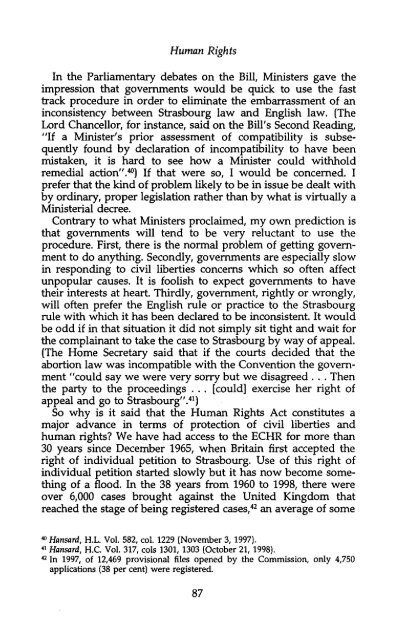HAMLYN - College of Social Sciences and International Studies ...
HAMLYN - College of Social Sciences and International Studies ...
HAMLYN - College of Social Sciences and International Studies ...
Create successful ePaper yourself
Turn your PDF publications into a flip-book with our unique Google optimized e-Paper software.
Human Rights<br />
In the Parliamentary debates on the Bill, Ministers gave the<br />
impression that governments would be quick to use the fast<br />
track procedure in order to eliminate the embarrassment <strong>of</strong> an<br />
inconsistency between Strasbourg law <strong>and</strong> English law. (The<br />
Lord Chancellor, for instance, said on the Bill's Second Reading,<br />
"If a Minister's prior assessment <strong>of</strong> compatibility is subsequently<br />
found by declaration <strong>of</strong> incompatibility to have been<br />
mistaken, it is hard to see how a Minister could withhold<br />
remedial action". 40 ) If that were so, I would be concerned. I<br />
prefer that the kind <strong>of</strong> problem likely to be in issue be dealt with<br />
by ordinary, proper legislation rather than by what is virtually a<br />
Ministerial decree.<br />
Contrary to what Ministers proclaimed, my own prediction is<br />
that governments will tend to be very reluctant to use the<br />
procedure. First, there is the normal problem <strong>of</strong> getting government<br />
to do anything. Secondly, governments are especially slow<br />
in responding to civil liberties concerns which so <strong>of</strong>ten affect<br />
unpopular causes. It is foolish to expect governments to have<br />
their interests at heart. Thirdly, government, rightly or wrongly,<br />
will <strong>of</strong>ten prefer the English rule or practice to the Strasbourg<br />
rule with which it has been declared to be inconsistent. It would<br />
be odd if in that situation it did not simply sit tight <strong>and</strong> wait for<br />
the complainant to take the case to Strasbourg by way <strong>of</strong> appeal.<br />
(The Home Secretary said that if the courts decided that the<br />
abortion law was incompatible with the Convention the government<br />
"could say we were very sorry but we disagreed . . . Then<br />
the party to the proceedings . . . [could] exercise her right <strong>of</strong><br />
appeal <strong>and</strong> go to Strasbourg". 41 )<br />
So why is it said that the Human Rights Act constitutes a<br />
major advance in terms <strong>of</strong> protection <strong>of</strong> civil liberties <strong>and</strong><br />
human rights? We have had access to the ECHR for more than<br />
30 years since December 1965, when Britain first accepted the<br />
right <strong>of</strong> individual petition to Strasbourg. Use <strong>of</strong> this right <strong>of</strong><br />
individual petition started slowly but it has now become something<br />
<strong>of</strong> a flood. In the 38 years from 1960 to 1998, there were<br />
over 6,000 cases brought against the United Kingdom that<br />
reached the stage <strong>of</strong> being registered cases, 42 an average <strong>of</strong> some<br />
40 Hansard, H.L. Vol. 582, col. 1229 (November 3, 1997).<br />
41 Hansard, H.C. Vol. 317, cols 1301, 1303 (October 21, 1998).<br />
42 In 1997, <strong>of</strong> 12,469 provisional files opened by the Commission, only 4,750<br />
applications (38 per cent) were registered.<br />
87

















